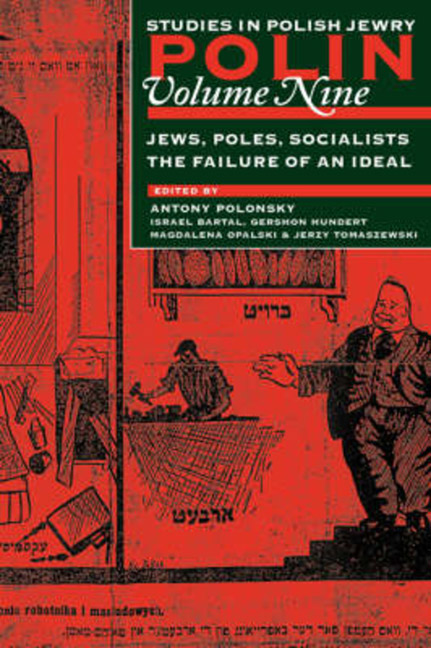Book contents
- Frontmatter
- Dedication
- Editors and Advisers
- Preface
- Acknowledgement
- Polin
- Polin: Studies in Polish Jewry
- Contents
- Note on Transliteration, Names, and Place Names
- Abbreviations
- Introduction
- PART I POLES, JEWS, SOCIALISTS: THE FAILURE OF AN IDEAL
- PART II NEW VIEWS
- Dov of Bolechów: A Diarist of the Council of Four Lands in the Eighteenth Century
- A Peaceable Community at Work: The Chevrah of Nasielsk
- Zionist Pioneering Youth Movements in Poland and their Attitude to Erets Israel during the Holocaust
- Resistance through Education: Polish Zionist Youth Movements in Warsaw, 1939-1941
- The Second Competition of Scholarly Works on Polish Jewish Themes
- PART III REVIEWS
- REVIEW ESSAYS
- BOOK REVIEWS
- Bibliography Of Polish-Jewish Studies, 1993
- Notes on Contributors
- Notes on Translators
- Glossary
- Index
Dov of Bolechów: A Diarist of the Council of Four Lands in the Eighteenth Century
from PART II - NEW VIEWS
- Frontmatter
- Dedication
- Editors and Advisers
- Preface
- Acknowledgement
- Polin
- Polin: Studies in Polish Jewry
- Contents
- Note on Transliteration, Names, and Place Names
- Abbreviations
- Introduction
- PART I POLES, JEWS, SOCIALISTS: THE FAILURE OF AN IDEAL
- PART II NEW VIEWS
- Dov of Bolechów: A Diarist of the Council of Four Lands in the Eighteenth Century
- A Peaceable Community at Work: The Chevrah of Nasielsk
- Zionist Pioneering Youth Movements in Poland and their Attitude to Erets Israel during the Holocaust
- Resistance through Education: Polish Zionist Youth Movements in Warsaw, 1939-1941
- The Second Competition of Scholarly Works on Polish Jewish Themes
- PART III REVIEWS
- REVIEW ESSAYS
- BOOK REVIEWS
- Bibliography Of Polish-Jewish Studies, 1993
- Notes on Contributors
- Notes on Translators
- Glossary
- Index
Summary
THE COUNCIL OF FOUR LANDS (Va'ad Arba Aratsot) was convened in the 158os and lasted until 1764, when it was dissolved by a decision of the Convocational Sejm. The first known document which with all certainty originates from the deliberations of the Sejm of the Four Lands and deals with the decisions it took was drawn up in 1581. The last surviving document, however, dates from the years after 1764 and deals with discussions on the ways of paying Jewish community dues, which were owed to the Liquidation Commission for the Council's debts. No original documents from the period of nearly 200 years between these two dates have survived, with the exception of three pages from the Council minutes. The existing gaps in the record were a stimulus to try to reconstruct it at least partially. The fundamental work by Professor Israel Halpern of Jerusalem is the result of a search lasting many years. Using various sources from both within and outside the Jewish community, Halpern re-created a credible version of the texts of resolutions by the Council of Four Lands. His work was not conclusive; further searches by other scholars have shown that a fair number of new documents could be added to Halpern's text. I have recently been taking part in work on the publication of a new edition of the Va'ad resolutions, corrected on the basis of Professor Halpern's notes and supplemented by new documents supplied by colleagues in Israel and abroad.
The picture of the Council of Four Lands which emerges from these diverse sources differs considerably from that presented in nineteenth-century literature. The Council was generally described at that time (and it was assumed that this was also the case earlier) as fulfilling national and religious functions-a view that had little in common with the considerably more prosaic reality. However, this view became particularly well established in historiography, and has in fact been maintained up to the present. Most Jewish historians view the Council of Four Lands anachronistically, from the point of view of those processes which led to the development of a feeling of modern national awareness, something which grew during the nineteenth century and in the first decades of the twentieth.
- Type
- Chapter
- Information
- Jews, Poles, Socialists: The Failure of an Ideal , pp. 187 - 191Publisher: Liverpool University PressPrint publication year: 2008

